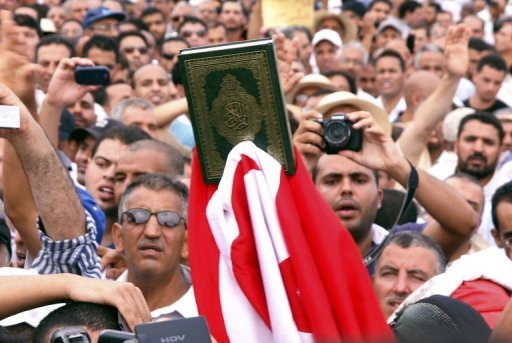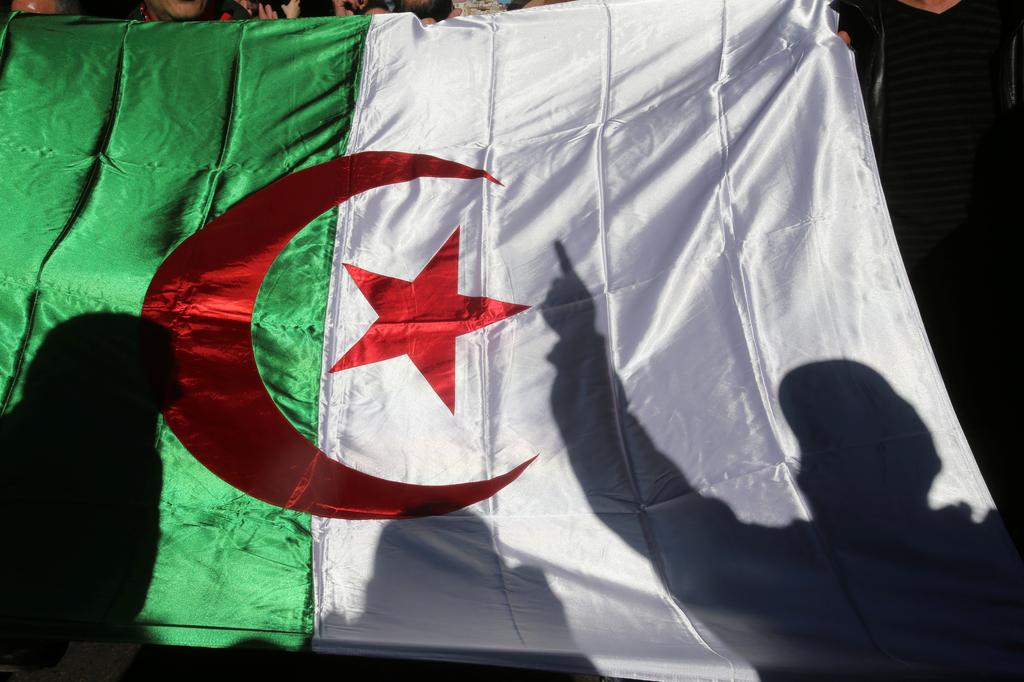
TUNIS — These are trying times for Ennahda, the moderate Islamist party that won a controlling share of seats in Tunisia’s interim government in elections last year.
The stress the party is under is visible in the weary, ironic smile of Ameur Larayedh, the head of Ennahda’s political bureau. The way Larayedh sees it, Ennahda is being racked more and more severely between the two sides of a deeply divided country.
“There is a need for a moderate Islamist party in Tunisia that can be the democratic backbone of the nation. If there isn’t one, there could be civil war between these two poles: the radical Islamists and the radical secularists,” says Larayedh.
From Ennahda’s left come accusations that the party and the government it leads have been complacent in the face of Islamist violence, have mismanaged the economy, and have been attempting to control the media and security forces in ways reminiscent of former dictator Zine al-Abidine Ben Ali. Over the past few months, calls had circulated widely for 23 October — one year after last year’s elections — to mark the end of the legitimacy of the current interim government led by Ennahda.
Add to this the death last week of a representative of a major secularist coalition during a violent confrontation between its members and Ennahda supporters — the exact circumstances of which remain disputed — and what was once a scattering of complaints on the left becomes a unified roar of opposition.
But this does not mean that Ennahda’s conservative critics have gone away.
To Ennahda’s right stand the Salafis, the “radical Islamists” Larayedh referred to. The recent protests at the US Embassy over the “Innocence of Muslims” video resulted in significant destruction of embassy property, the evacuation of all non-essential embassy staff from the country and the deaths of four protesters; since then, the government has stepped up efforts to find and jail Salafis who were at the protest.
Almost 100 were arrested the day of the incident, and the number continues to grow. The arrests are being made on the basis of photos taken by police and perhaps surpass 300, according to a lawyer aiding in the defense of the accused.
Larayedh, whose brother and fellow party member Ali Larayedh is in charge of the Tunisian interior ministry, says the US Embassy incident has indeed led to strengthened efforts to find and arrest Salafis who committed crimes.
“It has pushed us toward perhaps a more severe application of the law concerning these groups,” says Larayedh. “We need to enforce the law, but no more than the law.”
Salafi leaders and their legal defenders, however, maintain that the government’s methods indeed amount to “more than the law,” accusing security forces of unfair targeting of young bearded men, and the use of undue force and humiliating methods when dealing with Salafi prisoners.
One sheikh who has been outspoken about the government’s treatment of Salafis is Khemis Mejri. Mejri was once a member of Ennahda during its heady revolutionary days under former President Habib Bourguiba, but left the movement at the end of the 1980s, when it entered the political process under Ben Ali. Mejri believed then, as he does now, that voting and civil law are contrary to the dictates of Islam, a stance that inevitably puts him at odds with the present incarnation of Ennahda.
Mejri was the keynote speaker at a recent Salafi “festival” held in Jbal al-Ahmar, a neighborhood of the capital whose unpaved streets testify to a jarring poverty just minutes away from some of Tunis’ most luxurious areas.
Mejri addressed a crowd of around 300 men and some 50 women who sat separated from the men by a makeshift barrier of faded, floral-printed fabric. He repeated what has been a common theme for him: The government does not care about the lives lost at the embassy because those who died were Salafis.
“The foreign minister said, ‘What happened at the embassy was a minor loss because, thank God, no Americans were killed.’ Four Tunisians were killed, but what are Tunisians? What is the value of a Tunisian compared with an American? What is the value of a Tunisian compared with a Frenchman, or a German?” Mejri asked.
In numerous interviews, Mejri has stated that the government has thrown between 800 and 900 Salafis in prison arbitrarily, and that these prisoners have been tortured. Mejri’s numbers are disputed by the lawyers of the accused, who say the total is no more than 350, including those arrested in past incidents of religiously motivated rioting.
However, the lawyers affirm Mejri’s claims of mistreatment and torture, and plan on arguing as much in their clients’ cases, based on ongoing medical examinations. They say many Salafis were badly beaten with batons and helmets after they were handcuffed, and forced to shave their beards in jail — a degrading act for a devout Muslim.
“The fact of arresting people in this way will not help things,” says Rafik Ghaki, a member of the Salafis’ defense team. “We will create people who will not participate in any state. You will never be able to communicate with those people, and I find that catastrophic.”
Both Ennahda and its Islamist critics are insistent that there are distinct branches of Tunisian Salafism that are widely divergent from each other in their ideology and aims. While different analysts break down the movement in different ways, most make a division between “scientific” or “reformist” Salafis who want Islamic law but through peaceful means, and “jihadi” Salafis who believe in violently combating the enemies of Islam, whether in Tunisia or in conflicts abroad, such as in Libya and Syria.
Larayedh of Ennahda judges the portion of Salafis who are jihadi to be minimal. For him, this type of extremism is a threat, but one that is manageable through strict enforcement of the law on one hand and “dialogue” with “religious youth” on the other.
Such dialogue, he says, will eventually moderate Tunisia’s young firebrands and bring them into the political fold. When pressed for details about how exactly the party is engaging this demographic, however, Larayedh was unable to provide any.
Amenallah Abu Abdallah is one of the youth to whom Larayedh would presumably like to reach out. Just out of college, he sells religious books and perfumes outside the Rahma Mosque in the Hay al-Khadhra suburb, a 10-minute train ride north of the capital. The mosque is known for the outspoken conservative political stances taken by its imam and the concentration of members of the Salafi group Ansar al-Sharia.
Abu Abdallah refuses to call himself a Salafi, but not because his views are any softer than that group. For him, jihad is the sixth pillar of Islam, a fundamental duty that all believers are required to perform. While the term “jihad” has different meanings in different contexts, Amen specifically refers to the early “ghazwat,” or “raids,” led by Prophet Mohamed, and makes it clear that he believes Muslims are obliged to combat the enemies of Islam — by force if necessary.
Abu Abdallah is unaware of any Ennahda representative having visited his neighborhood. Indeed, the “dialogue” that Larayedh promotes does not seem to have reached Hay al-Khadhra.
“Salafis here hate Ennahda. Salafis believe that Islam and religion should be law. But Ennahda is a political party; it participates in the capitalist system,” says Abu Abdallah.
He shares a belief held by many across the Salafi spectrum: that Tunisian security forces intentionally allowed the protest at the US Embassy to get out of control to provide a pretext for arresting and persecuting Salafis.
“God’s enemies attempt to trick him,” he says, “but God will trick them in the end.”
The thin whiskers of Abu Abdallah’s beard belie his youth and relative innocence. He has never held a gun, let alone shipped off to fight for his Muslim brethren in a foreign land, as some of his older comrades have. But his smiling embrace of jihad is a sign that Ennahda is a long way from winning the battle for the hearts and minds of Tunisia’s religious youth.
Until they do, the ideological rack on which Ennahda is stretched will likely continue to tighten.
This piece was originally published in Egypt Independent's weekly print edition.



